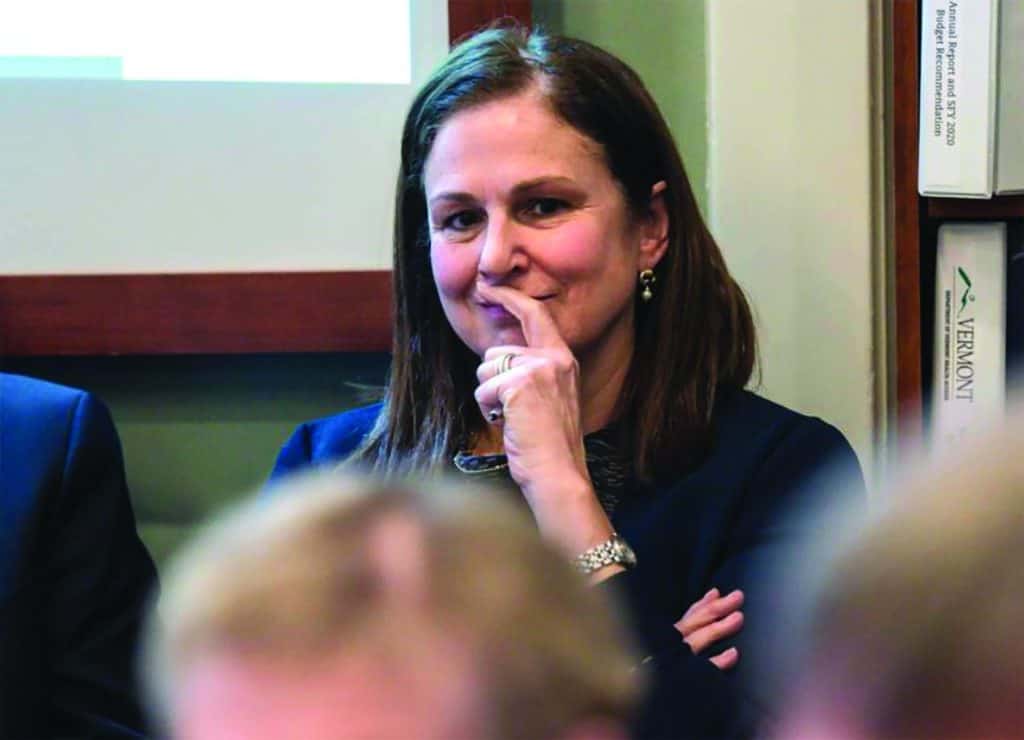
By Polly Mikula
Vermont businesses that have been hit hardest by the Covid-19 pandemic can now apply for up to $50,000 in emergency support. And some 2,300 businesses had as of 5 p.m. Monday, July 6, the first day the portals opened.
The process received generally positive reviews on its first day, with wait times averaging just five minutes and spiking at 20 minutes, according to Economic Development Commissioner Joan Goldstein, who reported on the process at the governor’s press conference, Tuesday, July 7.
The grant portal opened at 8 a.m. Monday, July 6. Funds are being awarded on a first-come, first-served basis and will be available until the money runs out.
The grant program first proposed by Governor Phil Scott’s administration and amended by the Legislature utilizes federal CARES Act funding to provide direct cash grants to Vermont businesses who have seen lost revenue because of Covid-19.
Governor Phil Scott signed into law Act 115, on June 19, which included $70 million for Emergency Economic Recovery Grants. Then on July 2, he signed into law H.966, which includes an additional $96 million for a number of business sectors.
The initial $70 million was split into two categories of business: $50 million is earmarked for businesses who pay rooms and meals or sales and use tax and is administered through the Dept. of Taxes; and $20 million is for all other private businesses and non-profits, administered by the Agency of Commerce and Community Development (ACCD).
“In total between tax and ACCD, some 2,300 applications were submitted [Monday],” said Goldstein. “Initial estimates so far about the dollar requests coming through the ACCD is nearly $20 million and for the tax application $37 million.”
“In the first day, I think the need from the Vermont business community was certainly made clear as the first $20 million that the Legislature appropriated for ACCD was pretty much requested on that very first day,” Goldstien said. “The second appropriation comes with many more strings attached and different details for different groups,” but the state agencies will work to start “shifting this next bucket of money immediately, too.”
About 1,000 of the applications Monday were filed through the tax dept. (restaurants, bars, lodging, retail, and entertainment) with 1,300 filed through the ACCD (all other businesses).
“Our businesses and their employees drive our economy, put food on the tables of Vermonters, and make our local communities better places to live,” said Governor Scott in a statement. “Helping these businesses survive is essential to the future of our state. These economic recovery grants are a first step to ensuring our economy survives this period, so we can look to thrive in the wake of this pandemic.”
Goldstein said state officials scrambled to set up a system to vet applications based on this criteria, especially with the Legislature making some last-minute changes to the program. One of these was decreasing the lost revenue threshold from 75% to 50%, which the Legislature did in H.966, signed just last Thursday, July 2.
In addition to demonstrating that a business has experienced a 50% or greater drop in total revenue in any one-month period from March 1, 2020 to Aug. 31, 2020, when compared with the same month in 2019, businesses also must have been operating before Feb. 15, 2020, make less than $20 million in revenue per year, and must have at least one employee.
The calculation for eligibility is annual revenue times 10%, with a cap at $50,000.
The state aims to issue grants once a week on a first-come, first-served basis starting immediately, for some.
Upon time-stamped submission, that application will be put into the “review queue,” according to the ACCD.
“Because the tax dept. has an established system and can verify data very quickly through their filings, we expect that money will start flowing out first,” Goldstein explained Tuesday. “On the ACCD side, the 1,300 applications received are now going through a two-step process to verify the details that are submitted. We are finding some errors in people’s applications, so we will be reaching back out to them to ensure they submit everything correctly. We are giving people another chance… we expect it will be several weeks before the ACCD payments can start to get issued.”
Business leaders have said the initial round of grants won’t be nearly enough to offset their losses, and Gov. Phil Scott has joined them in criticizing the Legislature for acting too slowly and cautiously. Democrats in charge of the money committees have kept some of the first federal stimulus package in reserve, until there is a clearer financial picture for the rest of this year.
Scott has said he is optimistic, however, that the Legislature will work swiftly on additional relief when it returns from recess in August.
Goldstein said she is well aware that many businesses that need help will not qualify for this round of small business grants, and that the initiative won’t meet the needs of many who do qualify.
“We know going in we’re not going to be able to help everybody, which is a terrible position and feeling to go about doing this,” she said. “But this is what we have and we need to make the best from it.
“We realize there are a lot of moving parts and multiple pieces of legislation that have been passed over the last few weeks, with different implications for different sectors and creating confusion in the business community,” Goldstein added. “We are developing a system where the ACCD grant resource center will work as the central place to direct businesses to the right application and eligibility requirements. It is our goal to distribute these funds as quickly and as seamlessly as possible.”
Colin Meyn and Anne Wallace Allen from VTDigger contributed to this report.




